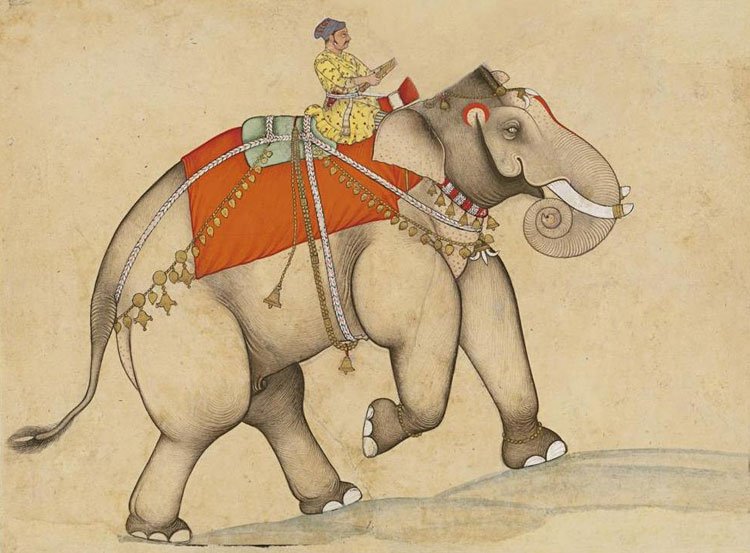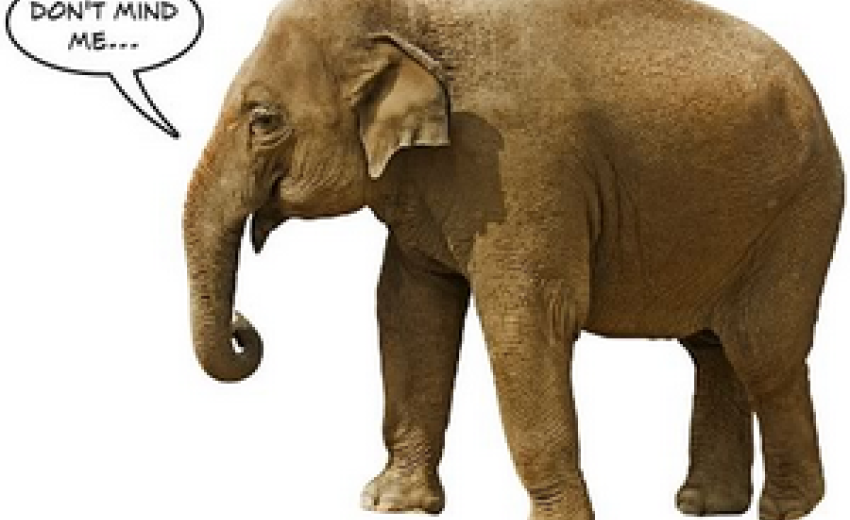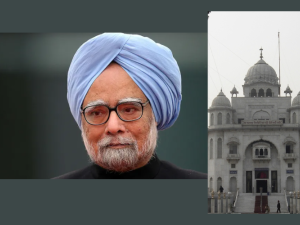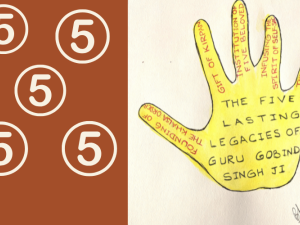
The metaphor of the elephant-mind has been frequently employed in Gurbani to describe the nature of the mind. In fact this is a traditional term for the inflated ego, which has been in use for a very long time. The earliest recorded use can be found in the Buddhist texts on the nature of mind.
Psychologists now have studied the mind have also come to similar conclusions regarding the mind. Let’s look at Gurbani first:
WhenGurbani portrays the elephant-mind, it is pointing to three marked characteristics of the elephant:
1. Elephants' enormously huge size being compared to inflated ego.
2. Elephants’ conduct upon eating fermented fruit or when purposefully fed alcohol.
3. Elephants’ lustful urges.
The first characteristic of egoistic mind is being compared to the size of the elephant. As the elephant brain weighs 5 kg and an average elephant weighs about 5,000 kg the comparison indicates the ballooning effect that can be attributed to ego. Gurbani poses the issue in these words:
“Mun taou maigal hoe rehaa nikasiaa kio kar jaae.”(SGGS, Pg. No. 509)
Meaning: The mind has become as big as an elephant; how can it pass through this (narrow) gate?
In order to relate to this metaphor of inflated ego let us first imagine ourselves as the rider hoisted on an elephant approaching a steep downhill. This frightening landscape, coupled with feeling of loss of control with panic setting in, paints a grim picture of the precariousness of the situation. This is the condition of our mind which has become a huge elephant of egocentric tendencies. It does what it desires and feels that it is in charge like a true master. Here the term narrow door is referring to the gate of salvation. It is termed narrow as bloated egoistic person cannot pass through that narrow or egoless gate.
The second characteristic of mind is being likened to a drunken elephant:
“Mun kee mut mataagal mataa.” (SGGS, Pg. No. 351)
Meaning: The intellect of the mind is like that of a drunken elephant.
During warfare in Middle Ages elephants were intoxicated with alcohol and then unleashed upon the opponents like weapons. The drunken elephants charging and trampling on the soldiers not just created chaos but also helped decide the outcome of wars. Therefore, Guru Ji has compared the human mind to a drunken elephant that inevitably creates destruction.
The third characteristic of mind that Guru Ji has referred to is the lustful nature of the mind as:
“Kaam haet kunchar lai faankiou ouhu par vas bhaio bichaaraa.”
(SGGS, Pg. No. 671)
Meaning: Lured by sexual desire, the elephant is trapped; the poor beast falls into the power of another.
Employing straw figures of female elephant as a decoy; placed over a dug up pit the wild male elephants were lured and thus captured. Once the male elephant was captured he was tamed over time; trained to follow the commands of rider. As the elephant is lured by lust, so is the mind enticed by lust and the mirage-like material world. Thus the material world is a snare that traps the mind.
Modern psychology has reached similar conclusions about the mind.
Jonathan Haidt, a professor at New York University Stern School of Business in his bestseller book The Happiness Hypothesis uses the analogy of elephant and rider to compare to automatic processing and controlled processing of the mind. His research led him to conclude that there are two minds - one, where most mental processes happen automatically and another where controlled processing takes place on a limited scale. He has compared these mental processes to a small rider and large elephant. The rider is our conscious thoughts (and emotions). The elephant is our unconscious emotions (and thoughts).
According to him the elephant includes gut feelings, visceral reactions, emotions and intuitions. The second mind which exercises controlled processing is limited and we can think consciously only about one thing at a time, compared to the automatic process that runs in parallel and can handle multiple tasks simultaneously. The elephant often does things for reasons the rider knows nothing about. The rider - the brain's interpreter module - is adept at "conflation". When queried, it simply makes up a plausible (but possibly quite misleading) explanation for our behavior or our attitudes. And in this, of course, we con ourselves as much as we con others.
In the book Thinking, Fast and Slow by Daniel Kahneman a psychologist (Nobel Prize in Economics 2002 for his Prospect Theory) the theme is human irrationality. Kahneman uses the terms System 1 or Intuitive Thinking to describe thinking that operates automatically and quickly, with little or no effort or sense of voluntary control. System 2 or Slow Thinking allocates attention to the effortful mental activities that demand it. The System 2 is associated with subjective experience of agency, choice, and concentration. He adds that System 2 (like the Haidt’s rider) believes itself to be where the action is, but actually the automatic System 1 (the intuition) is the hero of the book and “it cannot be turned off”.
The characteristic of the mind as the drunken wanderer was examined by psychologists Matthew A. Killingsworth and Daniel T. Gilbert of Harvard University and they published their findings in the online journal Science, 2010; 330 (6006): 932 DOI: 10.1126/science.1192439. Their findings are that people spend approximately 47 percent of their waking hours thinking about something other than what they’re doing, and this mind-wandering typically makes them unhappy. They write that; “The ability to think about what is not happening is a cognitive achievement that comes at an emotional cost.”
According to Killingsworth; “Mind-wandering appears ubiquitous across all activities. This study shows our mental lives are pervaded, to a remarkable degree, by the non-present.” In a new study, published online March 14, 2012 in the journal Psychological Science by Daniel Levinson and Richard Davidson at the University of Wisconsin-Madison and Jonathan Smallwood at the Max Planck Institute for Human Cognitive and Brain Science, reports that a person's working memory capacity relates to the tendency of their mind to wander during a routine assignment. "What this study seems to suggest is that, when circumstances for the task aren't very difficult, people who have additional working memory resources available to deploy them to think about things other than what they're doing;" Smallwood says.
The characteristic of lustful mind has been studied and published by Leander Van der Meij. He led the study at University of Groningen in Holland, said: “We found a testosterone increase after only five minutes of exposure to a woman. Our results suggest that the increase in testosterone levels that we found, may be an automatic male response that activates receptors in organs and the nervous system to prepare the human body for mate attraction.”
In a separate study Fisher, Aron, Mashek, Li and Brown under the title of Defining the Brain Systems of Lust, Romantic Attraction and Attachment have also come up with similar findings. In the study the authors say that; “Men tend to be more attracted to a partner’s physical appearance – particularly signs of youth and beauty, while women are more inclined to be attracted to men with money, education, and/or position.” Lust is driven by the sex hormones testosterone and estrogen. Testosterone is not confined only to men. It has also been shown to play a major role in the sex drive of women. These hormones as Helen Fisher puts its "get you out looking for anything".
These three characteristics make man blind to his rational mind or in other words System 2 gets sidelined. The inflated ego makes man commit errors of judgment and thwarts the growth of rationality that could lead man on the path of spiritual development.
According to David Mutchler; “Ego is not a place or a thing. It is a state of consciousness.” Happiness, Mutchler further explains, is attained by becoming aware of ego, learning more about what it is, where it originates, how to recognize it, and what to do when you find it. Gurbani too poses the question:
"Houmai kithhahu oopajai kith sanjam eih jaae". (SGGS, Pg. No. 466)
Meaning: Where does ego come from? How can it be removed?
What is the remedy offered by Gurbani?
We are enjoined to control the wanderer mind with the "whip" or "prod" of the "Gurbani", says the Guru in Guru Granth Sahib. Because, old habits die hard and the earlier we start we have more time for corrective action and less time for habits to become our nature.
We need to get rid of the domination of the ego and cultivate awareness (Vivek) that enables us to experience a higher reality, watch our own actions and words, and make appropriate choices moment to moment.
“Man maigal gur sabad vasi aaiaa raam” (SGGS, Pg. No. 576)
Meaning: The mind-elephant is overpowered by the Gur-Shabad.
In fact Guru Amardas has described the process in these words:
“Man kunchar peelak guroo giaan kunddaa jeh khinchae theh jaai. Nanak hasatee kunde baahraa phir phir ujharr paai.” (SGGS, Pg. No. 516)
Meaning: The mind is the elephant, the Guru is the elephant-driver, and awareness is the prod (whip). Wherever the Guru drives the mind, it goes. O Nanak, without the prod, the elephant wanders into the wilderness, again and again.
The egocentric elephant-mind will distract us and destroy us. The Guru is like the driver with a prod in hand that controls its wandering ways. The wandering nature of the ego results in human beings wandering through life after life in the endless cycle of birth and re-birth. The prod in the hand of the Guru provides the necessary stabilizing effect. It helps destroys the ego. It is only when the ego is driven out that the transformation of the elephant mind into the Divine Self starts. The final destination is rising above the cycles of birth and death and living consciously merged in the Creator. This is called Jiwan Mukta, liberated while alive.
References:
1. Haidt, Jonathan (2006). The Happiness Hypothesis
2. Kahneman, Daniel (2011). Thinking, Fast and Slow. Farrar, Straus & Giroux
3. http:/jamesmapes.com/blog. Mapes James. Your Mind: The Elephant and the Rider.
4. www.sciencedailycom/releases/2010/11/101111141759.htm. Mind Is a Frequent, but Not Happy, Wanderer
5. Fisher, Helen. Brains Do It: Lust, Attraction, and Attachment
6. www.telegraph.co.uk/science/science -news/3347689. Male Lust is blind, Research Suggests by Roger Dobson
7. Mutcher, David. Beyond the Ego
8. The Sydney Morning Herald; July 26, 2006. The Mind has an Elephant of its own.
9. www.gurbani.org. Elephant-Mind






